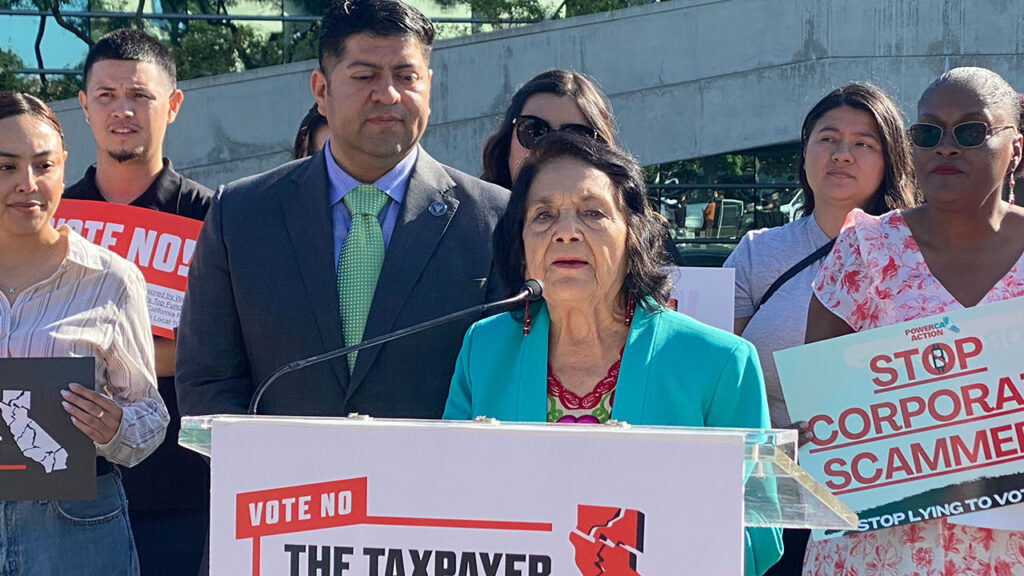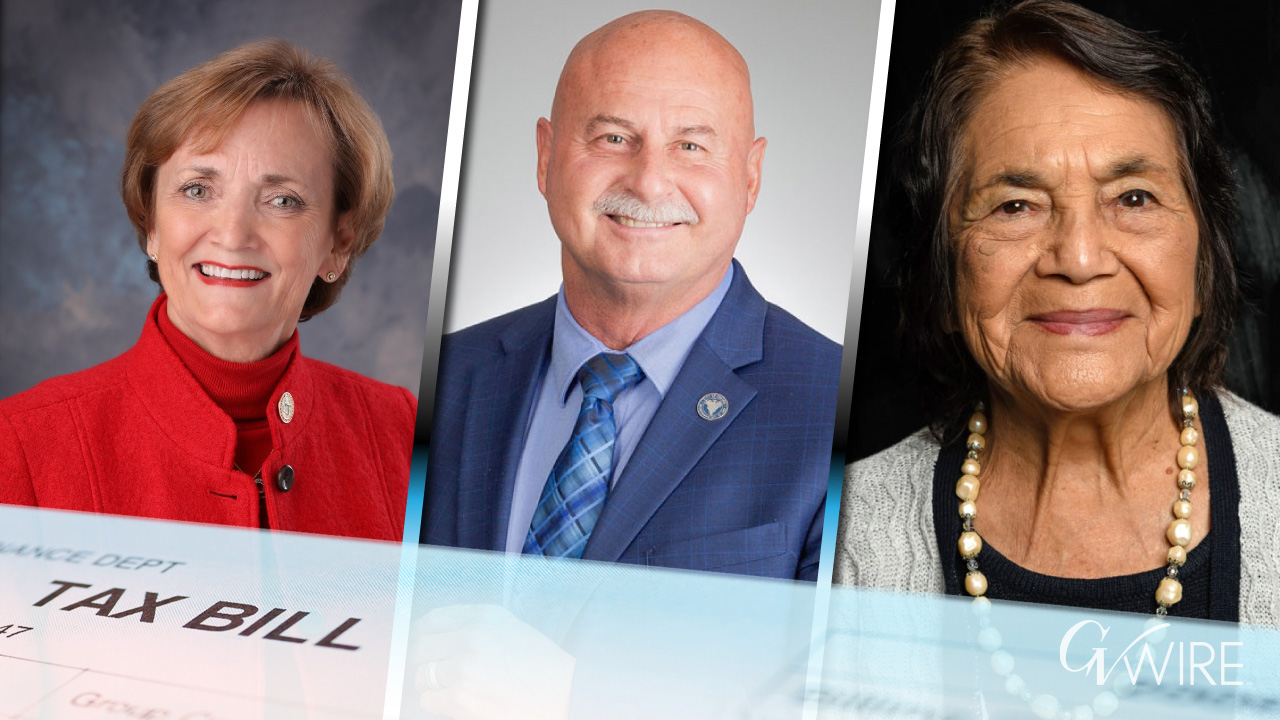Left to right: Clovis Mayor Lynne Ashbeck, Fresno Mayor Jerry Dyer, and civil right icon Dolores Huerta oppose the Taxpayer Protection and Government Accountability Act, which would make raising some state and local taxes more difficult. (GV Wire Composite)

- Dolores Huerta rallied at Fresno City Hall against a proposed state measure to make raising taxes more difficult.
- Local Republican Mayors Jerry Dyer of Fresno and Lynne Ashbeck of Clovis are also against it.
- Democrats led by Gov. Gavin Newsom challenged the measure, which is being heard by the state Supreme Court.
Share
|
Getting your Trinity Audio player ready...
|
Famed civil rights activist Dolores Huerta rallied at Fresno City Hall, opposing a proposed state ballot measure that would make it more difficult to raise taxes.
“It takes away the right of citizens to be able to vote for the things that they need because it’s so difficult,” Huerta told GV Wire on Thursday.
Politicians of all stripes — including Fresno Mayor Jerry Dyer, Clovis Mayor Lynne Ashbeck, and Fresno City Councilmember Luis Chavez — support Huerta’s position.
Whether voters will have a chance to decide on the November ballot is still in question. Supporters and opponents are at odds of what the proposed measure actually means.
Called the Taxpayer Protection and Government Accountability Act by supporters, the measure would require voters to approve most taxes at the state and local level. It would require more disclosures about the tax — mainly the purpose and duration. Most significantly, the voter approval threshold for some taxes would increase from a simple majority to two-thirds.
State taxes already need two-thirds support from the state Assembly and Senate. The measure would now require voters to approve the tax, with a simple majority vote.
City Hall Rally
Huerta and others used terms like “deception” and “scam” to describe the tax measure, and its supporters — business and taxpayer groups.
Jon Coupal, president of the Howard Jarvis Taxpayers Association, took exception to those labels. He said its the same thing opponents said about tax-fighting measures Proposition 13 and 218.
“It’s rather ironic that because of our accountability provisions, I think that’s what they complain the most about,” Coupal said. “That’s the opposite of deception. This is truth and advertising on tax measures.”
If voters gave approval to state taxes, the state Legislature-approved gas tax of 2017 would likely fail, Coupal said.
Opponents like Huerta said elected leaders are already responsible to the people.
Chavez also spoke in front of City Hall, opposing the proposed measure.
“They want to make it as hard as possible for people to be able to assess themselves. Right? That’s the reality of this. So you’re essentially giving (oone-third) of people, all the voice, all the power that drowns out the vast majority of people. I think to me, that’s what a fundamentally undemocratic,” Chavez told GV Wire.
“If (a simple majority is) good enough for all politicians to get elected, this should be good enough for residents to make that decision to tax themselves,” Chavez said.
Coupal said there are several instances of votes higher than a simple majority required. Unions require two-thirds to change their bylaws, Coupal said. A jury needs a unanimous vote in criminal cases, he added.
“Their notion that this is something new is bizarre,” Coupal said.

Local Republicans Oppose Tax Measure
High-profile Democrats such as Gov. Gavin Newsom oppose the tax revision measure, as do unions. They are joined by the League of California Cities, which is concerned that increasing the difficulty to raise taxes would be bad for municipal revenues.
Locally, the Republican mayors of Fresno and Clovis are also against the tax measure.
“It’s broad, vague and would subject the city to litigation, in terms of some past master fees and other types of community facility district measures that have been passed by the city,” Dyer said. “It’s not good for local government.”
He said California’s high tax nature has driven businesses away, but says this measure “is not the approach.”
“This initiative minimizes our resident’s voice in determining how the city funds essential and critical investments in public safety and infrastructure today and into the future. It would continue to diminish local control,” Ashbeck said in a news release.
Are Existing Taxes in Jeopardy?
The tax measure rules would apply retroactively, to certain taxes passed after Jan. 1, 2022.
Power CA Action, a left-leaning voting rights group that organized the Fresno City Hall rally, said the measure would undo several Fresno County measures including:
- Measure B in Clovis — raising hotel taxes for the general fund— passed in 2022 with 70% of the vote.
- Measure G in Kerman — raising hotel taxes for the general fund— passed in 2022 with 62% of the vote.
- Measure H in Mendota — raising the sales tax for the general fund — passed in 2022 with 57%.
“Absolutely not true,” Coupal said.
He said the new tax measure would only increase the threshold for taxes with specific purposes, not general taxes — which go to a city’s general fund with no spending restrictions. Either way, Clovis’ Measure B would remain since it achieved more than two-thirds.
The new tax measure would not change Measure P — the city of Fresno sales tax increase approved by voters in 2018. A similar tax in the future that goes to a specific purpose, such as parks, would need the higher two-thirds threshold. Measure P passed with 52%.
Even though Measure P won a majority, the city deemed it failed at the time because of City Hall’s belief that it required two-thirds for approval. Higher courts ruled there is a distinction between specific taxes placed on the ballot by the government — requiring the higher threshold — or by the petition signature process, which just needs a majority.
The new tax measure would remove that distinction.
Power CA Action also said the new measure would reverse several school bonds passed since 2022. Coupal said the proposal does not apply to such bonds.
Other county tax measures passed since 2022 would remain. Measure Z retained the sales tax specifically for the Fresno Chaffee Zoo, passing with 82% — meeting the new tax measure standards of two-thirds support.
Will Measure Even Be on Ballot?
Newsom, the state Legislature and others challenged the legality of the measure being on the ballot, taking it to the state Supreme Court.
The argument is whether this is just an amendment to the state Constitution, which voters are allowed to change; or a more fundamental revision to the Constitution, which requires a different method beyond a decision by voters.
Supporters of the measure submitted enough signatures to otherwise qualify the item for the November ballot.
“I always believe that the voters need to be aware of what they’re voting for, and I don’t believe that this particular act is specific enough, that the voters would actually know what they’re voting for. It is broad and vague in nature, lacks specificity, and I think it would create more confusion, in the future than the voters would even know,” Dyer said.
The Court heard arguments on May 8, and is expected to make a ruling soon.




















